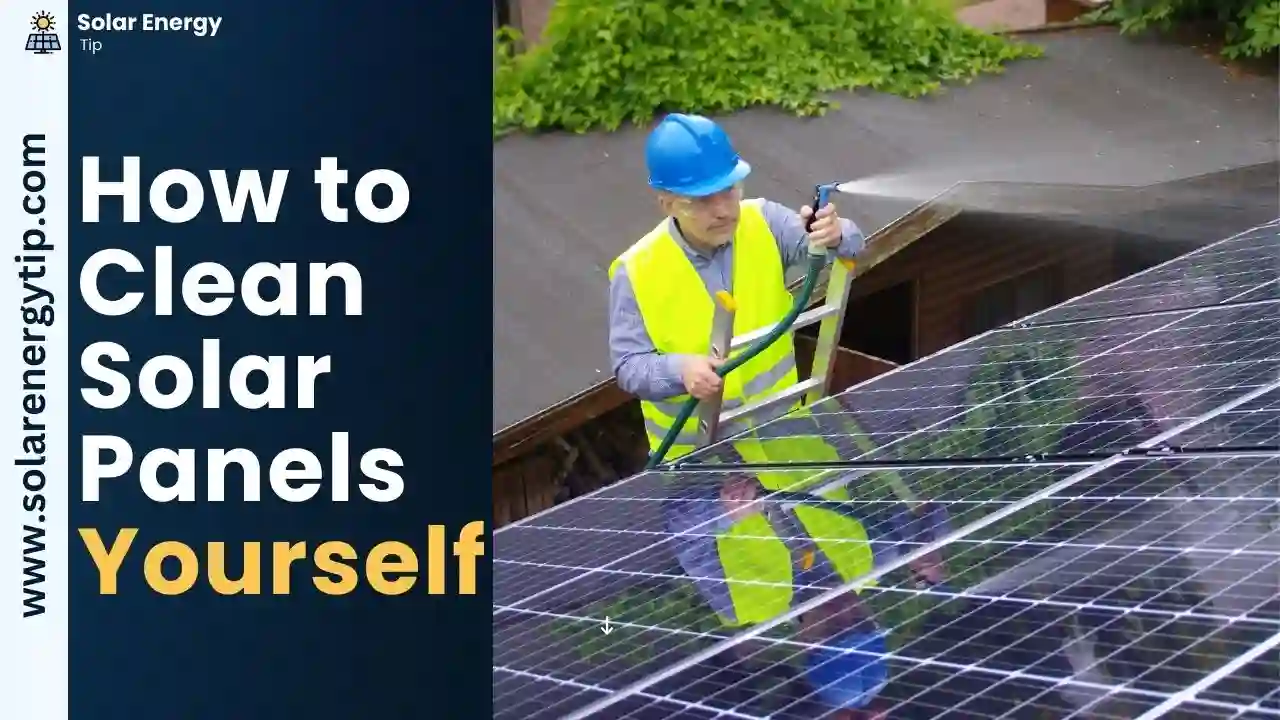You can pay more for electricity than necessary if your solar panels are dirty since they will produce less energy.
You have the option of cleaning your solar panels yourself or hiring professionals.
You can maintain the effectiveness of your solar panels and make long-term financial savings by taking a few easy measures and employing the proper equipment.
Let’s start with this instruction and discover how to clean solar panels yourself without a professional’s help.
- How to Clean Solar Panels Yourself: Step-By-Step Guide💦
- Common Mistakes to Avoid When Cleaning Solar Panels Yourself ❌
- Troubleshooting and Problem-Solving in DIY Solar Panels Cleaning Process
- How Often Should I Clean Solar Panels?
- Locations That May Require More Frequent Cleaning
- Best Time of Year To Clean Solar Panels
- When to Clean Your Solar Panels
- How To Turn off Solar Panels For Cleaning?
- How Important Is Cleaning Solar Panels?
- Can You Clean Solar Panels With Tap Water?
- How to Maximizing Efficiency with Advanced Techniques For Solar Panels With DIY Cleaning
- FAQs
- Conclusion
How to Clean Solar Panels Yourself: Step-By-Step Guide💦
Clean solar panels maximize energy generation. Self-cleaning solar panels are cheaper than hiring a professional.
So get ready to learn to clean solar panels yourself in your home. Step-by-step information is given here.
Let’s Start…👉
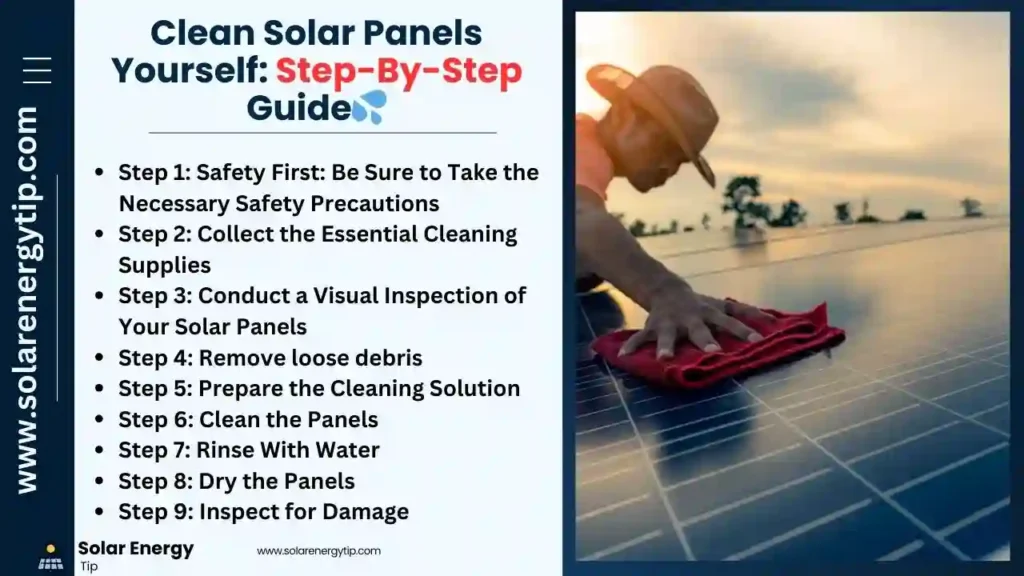
- Step 1: Safety First: Be Sure to Take the Necessary Safety Precautions
- Step 2: Collect the Essential Cleaning Supplies
- Step 3: Conduct a Visual Inspection of Your Solar Panels
- Step 4: Remove loose debris
- Step 5: Prepare the Cleaning Solution
- Step 6: Clean the Panels
- Step 7: Rinse With Water
- Step 8: Dry the Panels
- Step 9: Inspect for Damage
Read More: Use Simple Green to Cleaning Solar Panels
Safety First: Be Sure to Take the Necessary Safety Precautions
The first step is safety precautions.
- Shut the solar panel system off: Before cleaning, turn off the solar panel system. This prevents electric shocks during cleaning.
- Wear the proper safety equipment: Wear gloves and non-slip shoes for safety. Gloves protect your hands while cleaning the panels.
- Utilize a solid ladder: Rooftop solar panels need sturdy ladders. Stabilize the ladder. Help with your height phobia.
- Watch out for slippery surfaces: Roof solar panels can become slippery when wet or soapy. Extra precautions prevent falls.
- Look for cracked or damaged panels: Before cleaning, inspect solar panels for damage, cracks, or loose connections. Professionally resolve concerns. Cleaning damaged panels is risky.
- Weather conditions should be considered: Consider the weather when cleaning solar panels. High gusts, rain, and thunderstorms can make cleaning dangerous. Use panels safely.
- Obey the manufacturer’s instructions: They may advise solar panel safety. These guidelines ensure safe, effective cleaning.
Carefully clean solar panels. For your safety and the solar panel system’s optimal performance, get professional cleaning help if unsure.
Gather the Necessary Cleaning Equipment
Gather the cleaning supplies before cleaning your solar panels to ensure a successful and efficient cleaning process. You will need the following materials, among others:
- Soft brush or sponge
- Microfiber cloth
- Bucket or spray bottle
- Mild detergent or dish soap
- Water Source
- Safety equipment
- Ladder or appropriate access equipment
- Protective eyewear (optional)
| No | Equipment | Purpose | Purchase |
|---|---|---|---|
| 1 | Soft Bristle Brush | Gently removes loose debris and dust. | Check Offer |
| 2 | Pole | Gently remove loose debris and dust. | Check Offer |
| 3 | Ladder or Scaffold | Allows safe access to panels on elevated surfaces | Check Offer |
| 4 | Microfiber Cloth | Provides a non-abrasive surface for cleaning | Check Offer |
| 5 | Non-Abrasive Sponge | Used absorbs extra water from the panels | Check Offer |
| 6 | Safety Gloves | Protects hands from potential hazards | Check Offer |
| 7 | Garden Hose | Used for rinsing the panels thoroughly. | Check Offer |
| 8 | Mild Detergent | Gently remove loose debris and dust. | Check Offer |
| 9 | Distilled Water | Ensures a streak-free cleaning process | Check Offer |
| 11 | Leaf Blower | Removes leaves and debris from panels | Check Offer |
| 12 | Spray Bottle | Convenient for applying the cleaning solution | Check Offer |
Inspect Your Solar Panels
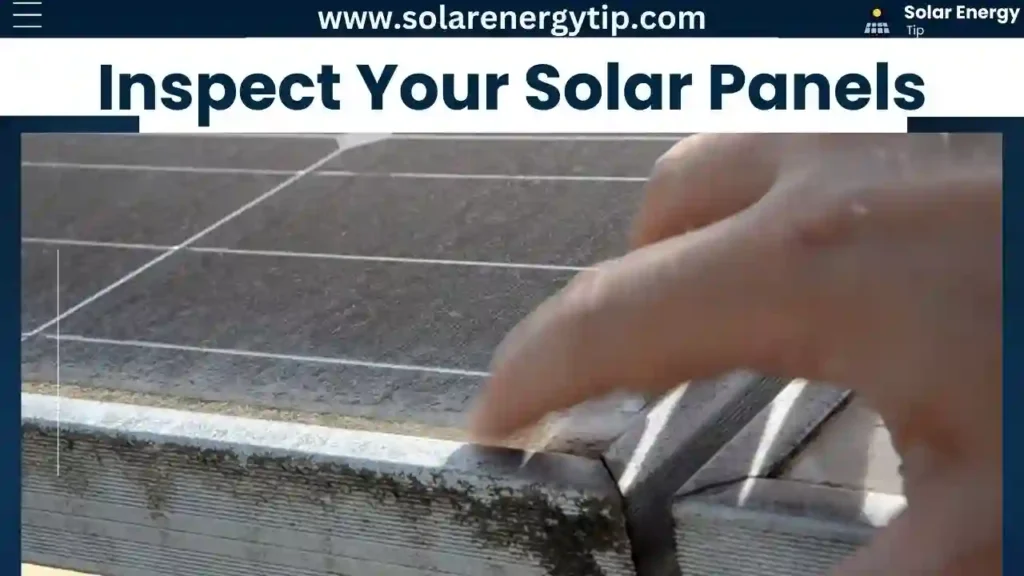
Before cleaning your solar panels, conduct a thorough inspection.
Check for damage, dirt buildup, shading, loose mounts, wiring issues, and signs of water ingress.
Ensuring the panels are in good condition before cleaning will optimize the cleaning process and maintain the performance and lifespan of your solar panel system.
Remove Loose Debris
The fourth step is to clean up loose Debris.
Before cleaning your solar panels, removing loose debris is crucial to ensure effective cleaning.
Safely brush or use a leaf blower to remove leaves, dust, and other particles.
Be careful not to use rough substances or excessive pressure that could scratch the panels.
Ensure all areas are clear as you work your way down, starting at the top.
Prepare the Cleaning Solution
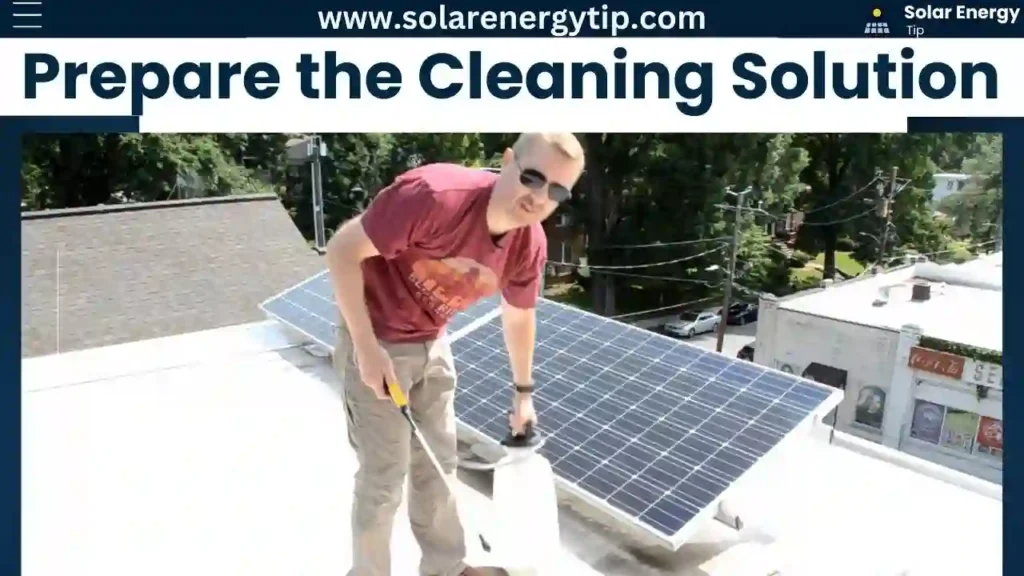
Cleaning solar panels requires preparing the cleaning solution. Get a bucket or spray bottle, mild dish soap, and clean water.
As directed by the manufacturer, dilute the detergent in water. Gently stir the mixture to prevent creating too much foam.
Check compatibility on a small region. Consider eco-friendly alternatives. Consult the manufacturer’s directions.
Properly preparing the cleaning solution guarantees successful cleaning and helps solar panels last longer.
Clean the Panels
After preparing the cleaning solution for the solar panel, it is time to clean it.
Dampen a soft-bristled brush or sponge with the cleaning solution and gently scrub the surface of the solar panel in a circular motion. 🌀
Where a substantial amount of dirt is stuck, apply more pressure to clean the dirt.
Clean the solar panel systematically from top to bottom with a long-handled, water-fed soft bristle brush.
Rinse With Water
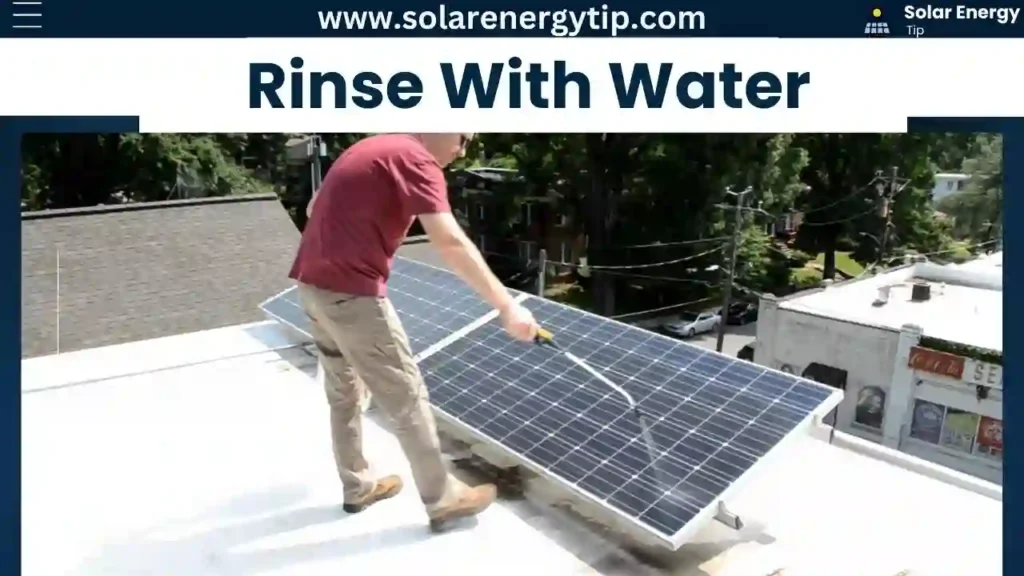
Then, rinse solar panels with clean water to remove the cleaning solution and ensure a residue-free surface.
Start from the top and thoroughly rinse each panel with water using a hose with a gentle spray nozzle, paying attention to corners and edges.
If needed, clean the surface with a gentle sponge or cloth. Allow the panels to air-dry naturally, avoiding abrasive materials.
Rinsing ensures a clean surface for optimal solar panel performance.
Dry the Panels
After rinsing, allow the solar panels to air-dry naturally, taking advantage of sunlight and airflow.
Check for any remaining water droplets and gently tilt the panels to encourage water runoff.
Dry the panels gently by working your way down from the top with a soft, lint-free cloth.
Inspect for streaks or water spots and buff with a clean cloth if necessary.
Proper drying ensures a clean, spotless surface, promoting optimal solar panel performance.
Inspect for Damage
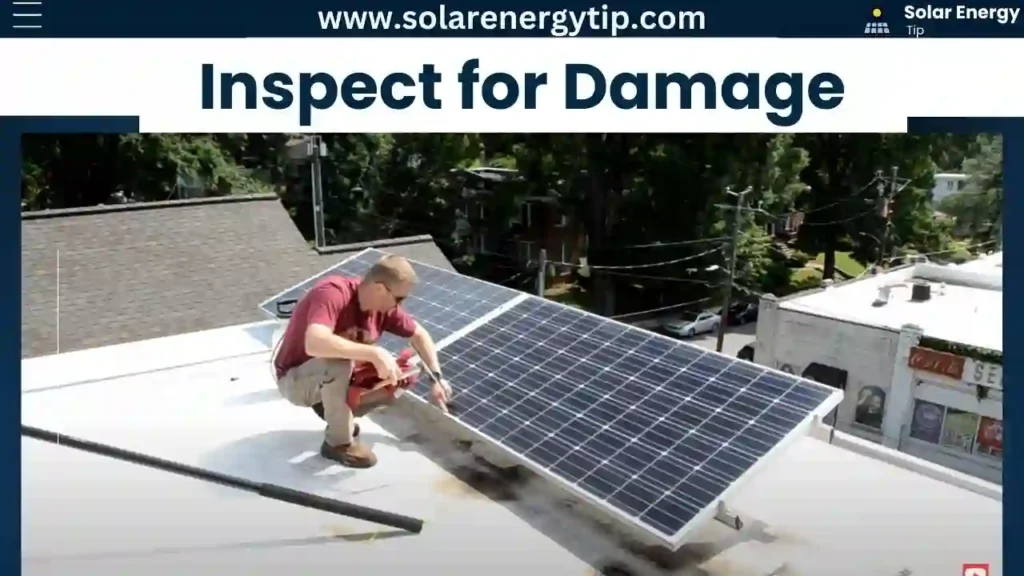
While cleaning the panels, check for past damage or wear. To detect issues early, do this.
Check the components for cracks, broken connections, or other issues that could impede their functionality. If you locate any, you require component replacement.
If you discover substantial damage, contact a maintenance specialist immediately to schedule an appointment.
So, after completing the step-by-step steps on cleaning solar panels by yourself, turn on the solar panel and continue generating electricity regularly.
Common Mistakes to Avoid When Cleaning Solar Panels Yourself ❌
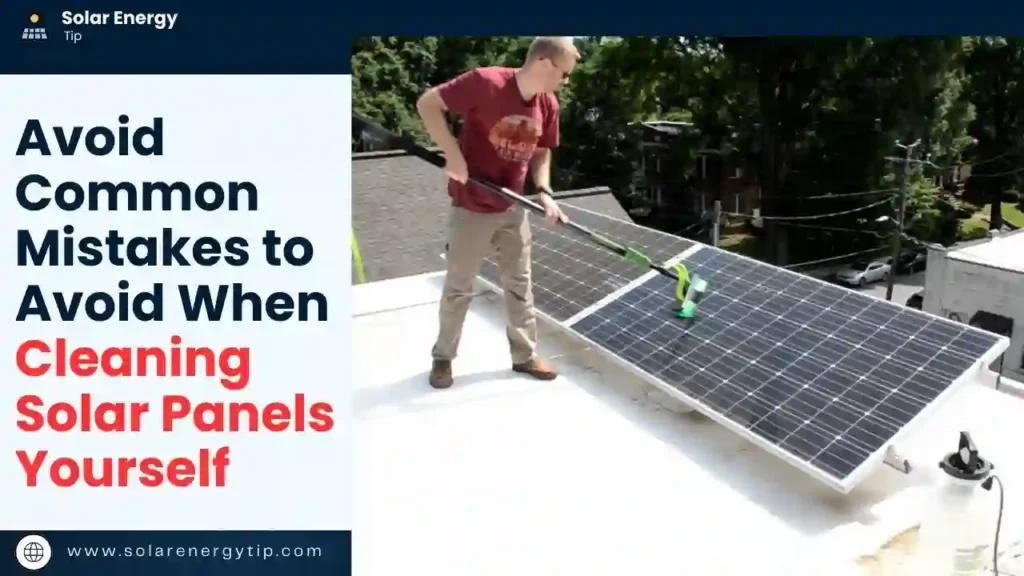
When you start learning to clean solar panels by yourself, it’s important to avoid common mistakes that can damage your panels and reduce their efficiency.
Sure, here’s a listicle of common mistakes to avoid when cleaning solar panels yourself:
Troubleshooting and Problem-Solving in DIY Solar Panels Cleaning Process
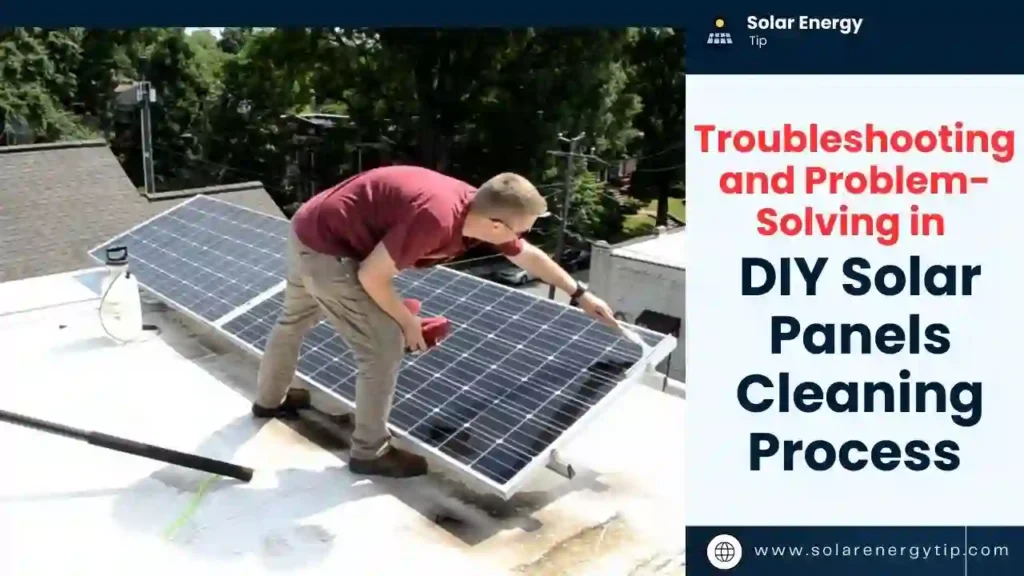
Self-cleaning solar panels conserve energy and money. Address Troubleshooting and Problem Solving after learning to clean solar panels.
These troubleshooting and problem-solving methods clean and improve solar panels.
How Often Should I Clean Solar Panels?
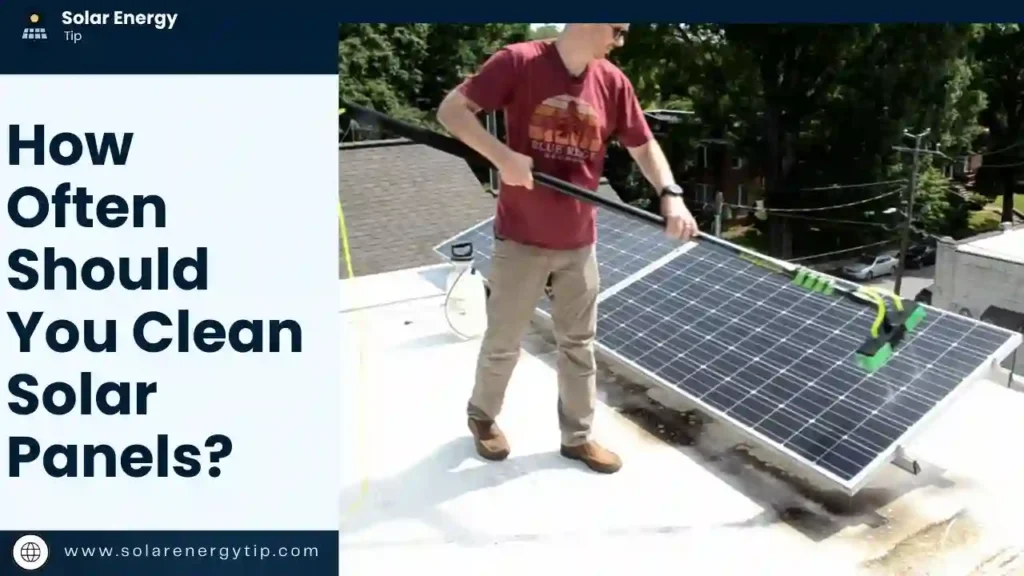
Solar panels should be cleaned once in 6 months to a year to maintain them producing usable energy. Depending on environmental factors, more frequent cleaning may be necessary.
To learn how to clean solar panels yourself, obtaining information regarding the frequency of cleaning is essential.
You can save money by cleaning the solar panels yourself, but to achieve the greatest savings, you must choose how frequently to do it.
The climate, location, and amount of dirt and debris on the panels influence how often you need to clean them. These parameters decide your cleaning frequency.
Solar panels may need more frequent cleaning in dusty, drought-prone areas. Dust storms can mix up small particulate matter that sticks to panels.
Solar panels should be cleaned twice every calendar year.
If energy production decreases, you may need to clean them more often. Clean and maintain your solar panels to maximize their capacity and save money.
Locations That May Require More Frequent Cleaning
Places with high levels of dust, pollen, pollution, or industrial dysfunction often require more frequent cleaning of solar panels.
Suppose you live near construction sites, agricultural sectors, or busy roads.
In that case, you can accumulate dust and debris more quickly, reducing the efficiency of your panel.
Similarly, the presence of birds may experience more frequent bird droppings on the territories of the presence of the birds, such as coastal areas or bodies near the water.
In addition, places with tree companies, such as large vegetable areas, may require more regular cleaning.
It is important to consider these factors and adjust the cleaning frequency accordingly to ensure the best performance of solar panels.
These US locations may require more frequent cleaning:
Arizona, Nevada, and New Mexico are dry, so they clean solar panel dust more often.
Salt spray, sea mist, and airborne particles may require extra cleaning.
- Florida
- New York
- Massachusetts
- California
- Oregon, and
- Washington
These variables may generate tenacious deposits on panels, reducing performance.
Industrial or automobile-heavy cities degrade solar panels faster. Houston, LA, and Chicago may need more cleaning for efficiency.
Midwest and Southeast: high pollen. Pollen stains solar panels.
Best Time of Year To Clean Solar Panels
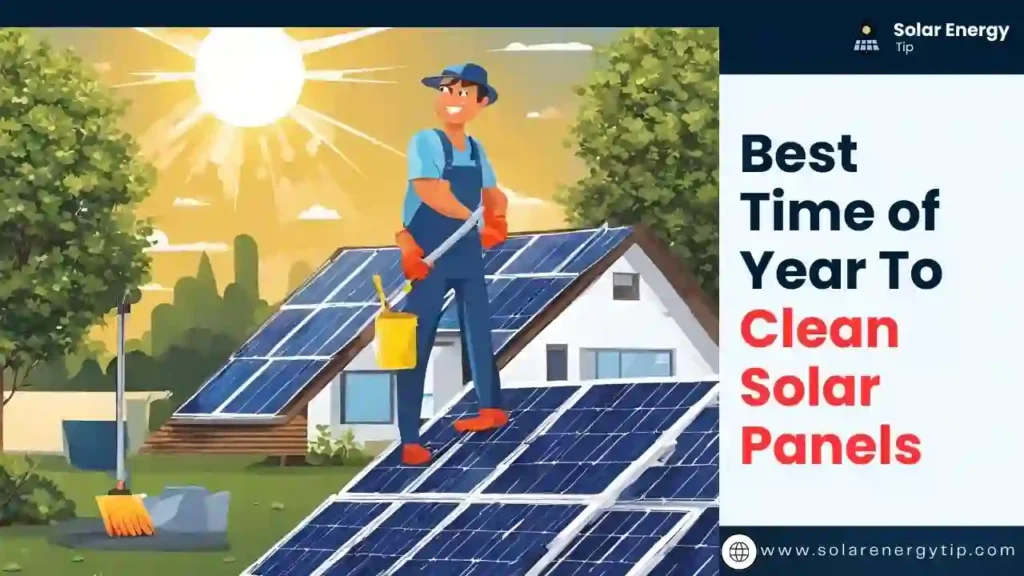
You must think about the best time to clean the solar panels below.
When to Clean Your Solar Panels
How To Turn off Solar Panels For Cleaning?
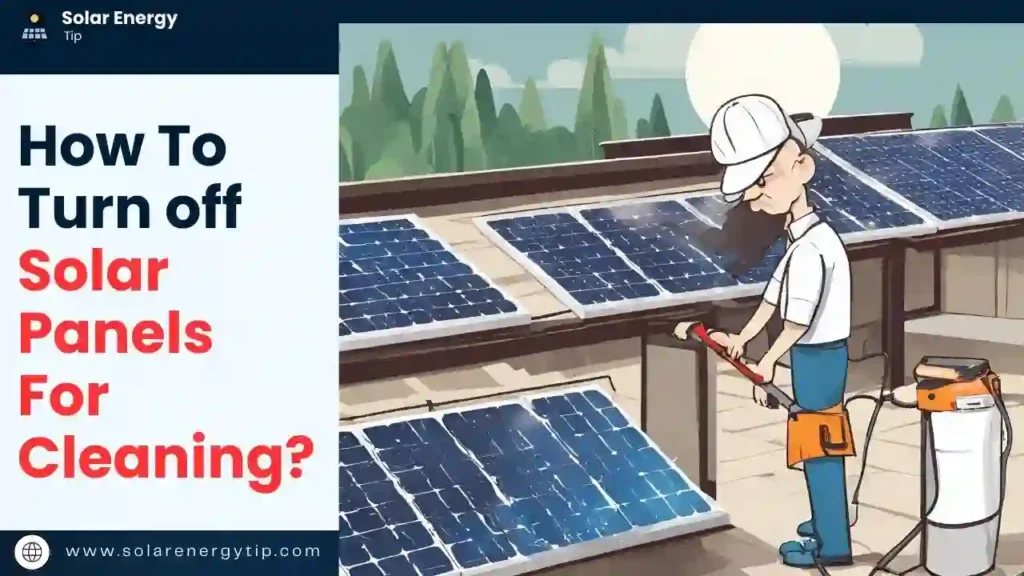
Before starting to clean solar panels by yourself, follow your user manual or inverter manufacturer’s shutdown instructions. Shut down DC systems. The Solar Supply Main Switch shuts down AC systems.
To clean solar panels, some short steps are considered, which are below.
- Check the weather before turning off the panels.
- Turn off the main inverter switch or breaker.
- Disconnect from AC power by turning off the AC disconnect switch or breaker.
- Visually verify the solar panels have powered down
- After confirmation, clean as instructed.
- Clean safely
Follow these instructions to shut down and clean your solar panels safely. Safety and competent aid are vital.
How Important Is Cleaning Solar Panels?
Regularly cleaning solar panels is vital for
- Maintaining efficiency
- Maximizing energy production
- Protecting your investment
- Extended lifespan
- Long-term cost efficiency
Accumulated dust and debris hinder sunlight absorption, reducing electricity generation.
Cleaning removes obstructions, optimizing panel performance and increasing cost savings. Warranty requirements often mandate regular cleaning to preserve coverage.
Clean panels prevent issues like hot spots and ensure reliable operation. Environmental factors like salt spray or pollution necessitate more frequent cleaning.
Can You Clean Solar Panels With Tap Water?
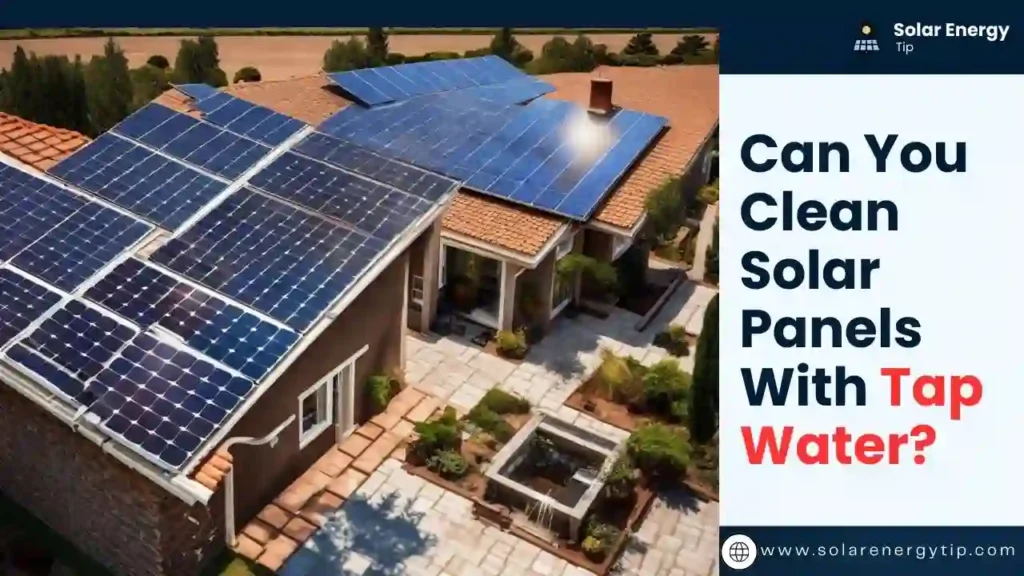
Mineral-rich tap water may be harmful to washing solar panels. Tap water cleans solar panels, but you must dry the surface to remove mineral residues that may cause problems later.
If you know how to clean solar panels, inquiring if you may clean them with tap water can help you save money.
The reply is yes but with some restrictions. The minerals and chemicals in tap water may create a residue on your solar panels, reducing their effectiveness.
The best water to use is deionized or distilled, found in most hardware stores.
Use clean water to rinse the panels after tap water, if necessary, completely.
How to Maximizing Efficiency with Advanced Techniques For Solar Panels With DIY Cleaning
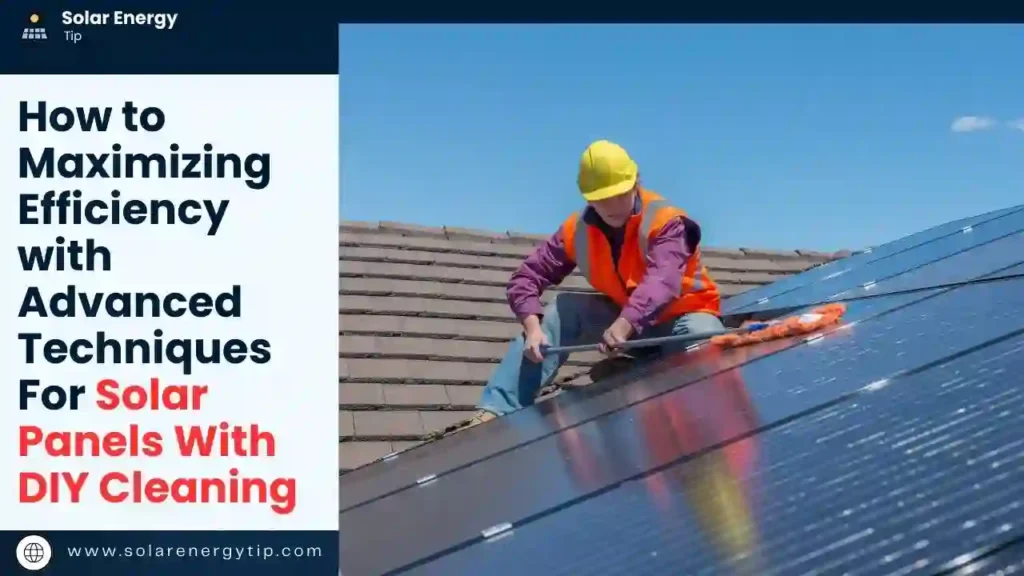
Self-cleaning solar panels can be affordable to maintain effectiveness and lengthen their lifespan.
To further increase their effectiveness, you can apply a few sophisticated strategies. Here are a few Techniques:
- Use a squeegee
- Use a water-fed pole
- Use a solar panel cleaning robot.
- Install bird deterrents
- Check for damage
- Focus on the edges
- Monitor efficiency
You can ensure that your solar panels are clean and perform efficiently by using these sophisticated ways to learn how to clean solar panels yourself.
FAQs
Is it safe to clean solar panels yourself?
Yes, solar panel cleaning is safe if done properly. Before cleaning, turn off the solar system, use gentle cleaners, and avoid heavy pressure or abrasives.
Can I use regular household cleaners to clean solar panels?
Regular home cleaners may contain chemicals that damage panels, so avoid them. Follow the manufacturer’s directions for mild soap or solar panel cleaners.
Should I clean my solar panels during winter?
Winter temperatures make solar panel cleaning difficult. Clean them before winter or mild weather when the panels are not icy or snow-covered.
Can I use Dawn dish soap to clean my solar panels?
Yes, you can use Dawn dish soap to clean your solar panels. This mild detergent cleans panels well. Dilute it with water and apply with a soft sponge or towel. Rinse thoroughly.
What should I do if I notice a drop in my solar panel’s performance after cleaning?
There may be other difficulties if your solar panels function poorly after cleaning. In such instances, a professional should inspect and repair.
Conclusion
In conclusion, routine solar panel cleaning is crucial for preserving effectiveness, boosting energy output, and protecting your investment.
You can save money and keep your solar panels performing at their best by using this detailed guide to clean them yourself.
Your solar panels will continue to produce the most energy possible and last longer with regular cleaning and maintenance.
Enjoy the advantages of effective, clean solar electricity while saving money.

